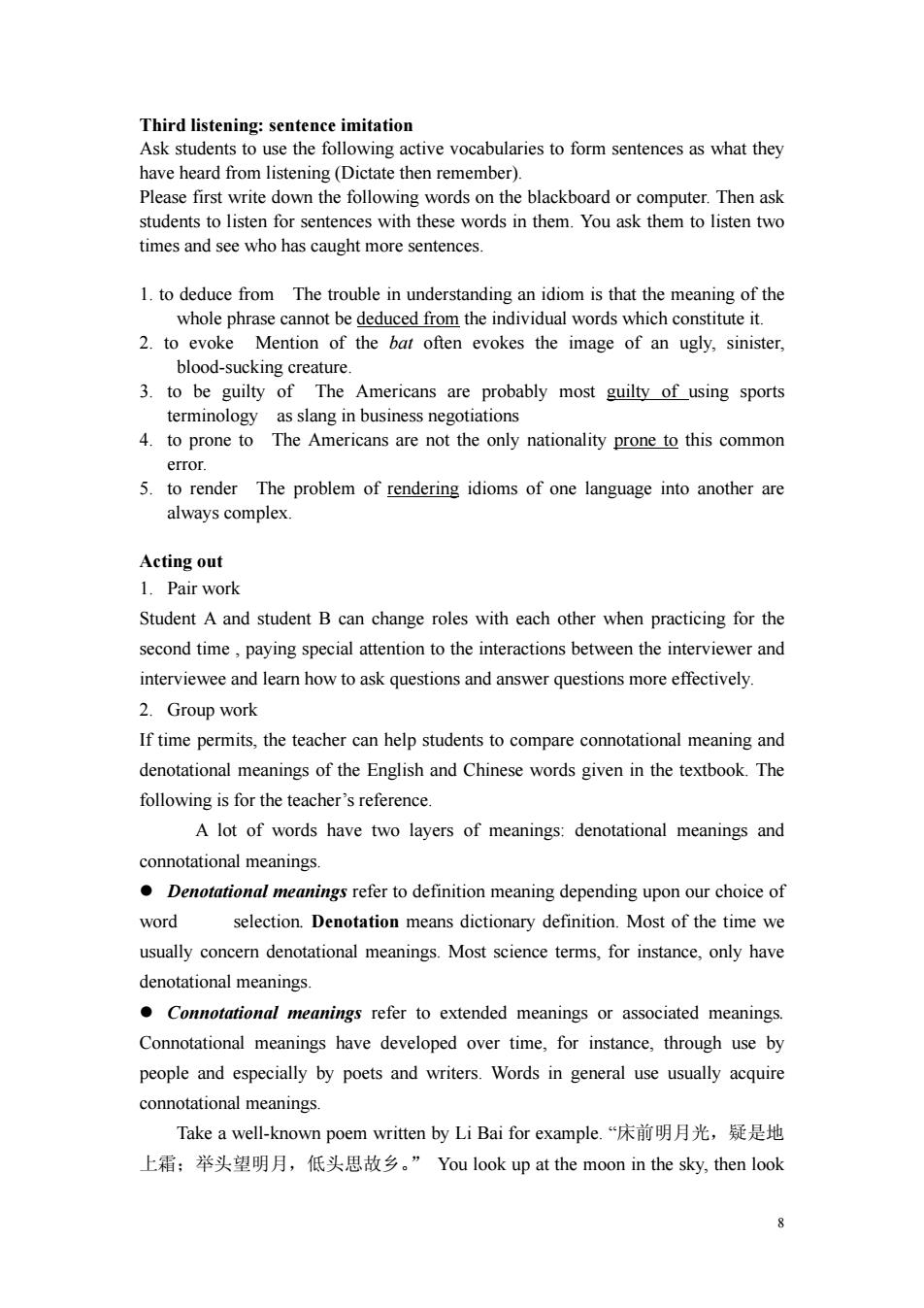正在加载图片...

Third listening:sentence imitation Ask students to use the following active vocabularies to form sentences as what they have heard from listening (Dictate then remember). Please first write down the following words on the blackboard or computer.Then ask students to listen for sentences with these words in them.You ask them to listen two times and see who has caught more sentences. 1.to deduce from The trouble in understanding an idiom is that the meaning of the whole phrase cannot be deduced from the individual words which constitute it. 2.to evoke Mention of the bat often evokes the image of an ugly,sinister, blood-sucking creature. 3.to be guilty of The Americans are probably most guilty of using sports terminology as slang in business negotiations 4.to prone to The Americans are not the only nationality prone to this common error. 5.to render The problem of rendering idioms of one language into another are always complex. Acting out 1.Pair work Student A and student B can change roles with each other when practicing for the second time,paying special attention to the interactions between the interviewer and interviewee and learn how to ask questions and answer questions more effectively 2.Group work If time permits,the teacher can help students to compare connotational meaning and denotational meanings of the English and Chinese words given in the textbook.The following is for the teacher's reference. A lot of words have two layers of meanings:denotational meanings and connotational meanings Denotational meanings refer to definition meaning depending upon our choice of word selection.Denotation means dictionary definition.Most of the time we usually concern denotational meanings.Most science terms,for instance,only have denotational meanings. Connotational meanings refer to extended meanings or associated meanings. Connotational meanings have developed over time,for instance,through use by people and especially by poets and writers.Words in general use usually acquire connotational meanings. Take a well-known poem written by Li Bai for example.“床前明月光,疑是地 上霜:举头望明月,低头思故乡。”You look up at the moon in the sky,then look 8Third listening: sentence imitation Ask students to use the following active vocabularies to form sentences as what they have heard from listening (Dictate then remember). Please first write down the following words on the blackboard or computer. Then ask students to listen for sentences with these words in them. You ask them to listen two times and see who has caught more sentences. 1. to deduce from The trouble in understanding an idiom is that the meaning of the whole phrase cannot be deduced from the individual words which constitute it. 2. to evoke Mention of the bat often evokes the image of an ugly, sinister, blood-sucking creature. 3. to be guilty of The Americans are probably most guilty of using sports terminology as slang in business negotiations 4. to prone to The Americans are not the only nationality prone to this common error. 5. to render The problem of rendering idioms of one language into another are always complex. Acting out 1. Pair work Student A and student B can change roles with each other when practicing for the second time , paying special attention to the interactions between the interviewer and interviewee and learn how to ask questions and answer questions more effectively. 2. Group work If time permits, the teacher can help students to compare connotational meaning and denotational meanings of the English and Chinese words given in the textbook. The following is for the teacher’s reference. A lot of words have two layers of meanings: denotational meanings and connotational meanings. z Denotational meanings refer to definition meaning depending upon our choice of word selection. Denotation means dictionary definition. Most of the time we usually concern denotational meanings. Most science terms, for instance, only have denotational meanings. z Connotational meanings refer to extended meanings or associated meanings. Connotational meanings have developed over time, for instance, through use by people and especially by poets and writers. Words in general use usually acquire connotational meanings. Take a well-known poem written by Li Bai for example. “床前明月光,疑是地 上霜;举头望明月,低头思故乡。” You look up at the moon in the sky, then look 8